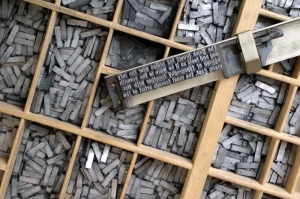Words are amazing. We string letters together to make words, and weave words to create the beautiful, funny and heart-stopping stories we all love. So I’ve decided that every fortnight I’ll document the new words I’ve discovered (or re-discovered) in the hopes of expanding my vocabulary. Anyone is free to follow suit! Let’s learn new words!
Down in the dark, noisy printing press rooms of the 19th century, the sound of typesetters was difficult to miss. The clicking of metal-on-metal seemed impossibly fast. The skilled typesetters had to work as quickly as possible. Their job was to place each metal-cast letter, upside-down and reversed, into a steel block. As you can imagine, this was an intricate and time-consuming process and, especially in the newspaper industry, time was  not something they had.
not something they had.
Printing books nowadays is a largely automated process, and texts are mass produced with little human intervention. Manly of the technical words used in the early printing press rooms have become obsolete, but some have lingered and become part of our everyday language.
Cliché
You could pull out an old newspaper and find many commonly used phrases. Adding those letters on one-by-one every time a certain phrase was used wasted precious time. So the letters of many phrases were cast together, into single blocks called, in France, clichés. Over time the word left France and came to mean the eye-roll inducing, over-used sayings we refer to today.
Stereotype
In English, clichés in printing were called stereotypes. Although stereotype could also refer to the plaster mould taken of the whole-page metal plates. These moulds were more flexible, and were what was placed on the rolling drums that printed onto blank newspaper. The moulds of book pages were stored for reprinting later, to save the time-consuming task of re-typesetting a 50,000 word novel.
Upper/lower case
While typesetters were click-clacking away, they had to get their letters from somewhere. Letters were sorted into two cases – capital letters in the upper case, and small letters in the lower case!
Do you know of any other printing-related words we’ve taken into everyday language? What new words did you learn this week?

